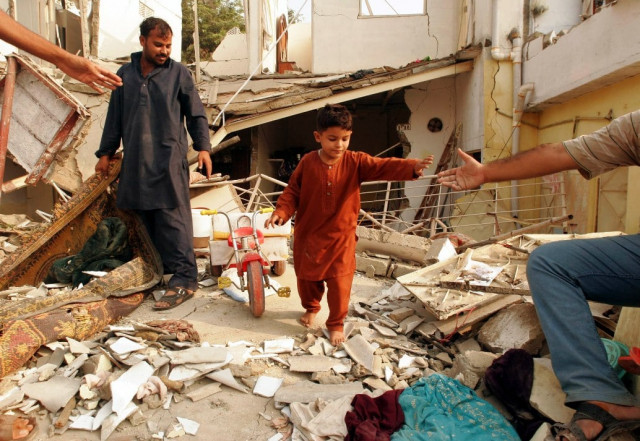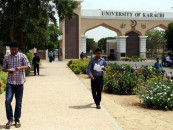Karachi’s brazen attack — many questions
The brazen attack on the CID offices in Karachi has added to the sense of insecurity across the country.

The attack on the Crime Investigation Department (CID) offices in Karachi’s main (apparently) high-security zone, a stone’s throw from at least two five-star hotels, the chief minister’s house and several other highly secured locations has added to the sense of insecurity across the country. There are fears that with some 140 people among the injured, the death toll of 17 could rise. The attack — predictably enough claimed by the Tehrik-e-Taliban Pakistan as revenge for killings in the North — mimics what we have seen before in Islamabad, Lahore and other cities. The gun attack which preceded the bombing, carried out by ramming a vehicle laden with over a thousand kilogrammes of explosives into the building, was intended to engage guards and open up the way for the attackers to unbar gates and enable the van they used to make its way past barriers. We have seen exactly the same methods used in attacks on the Marriot Hotel in Islamabad in September 2008 and later in bombings targeting government and security forces buildings in Lahore. It should not be too much to ask that a strategy be developed to counter such tactics, those on guard duty forewarned to watch out for the use of this game-plan and the requisite training and equipment provided to them to prevent terrorists from succeeding.
As things stand now, the security in the cities really serves only limited purpose in that it seems to be more cosmetic than anything else. While the rows of policemen or personnel from other security agencies standing behind heavy-duty barricades may make it seem as if we are safe, it is quite obvious that they can do little to prevent attacks. Karachi’s brazen attack goes to show that simply placing barriers and barbed wire around sensitive areas does not deter the terrorists, who always seem to be two steps ahead of the security and law-enforcement agencies. Indeed, by striking at locations inside high-security areas in major cities with seeming impunity, the TTP seems almost to be mocking the claim of the government that it is winning the fight against militancy and terrorism. They must be laughing too at a vast intelligence apparatus that apparently remains unable to penetrate the terrorist groups or gain any kind of advance information as to their plans. We ask then what the purpose of such agencies is or why we retain them at considerable cost. This aspect of the problem needs to be assessed and analysed.
The attack in Karachi reminds us that we are still in the grip of terrorists. At best, their grasp has been slightly loosened. But they quite evidently retain the capacity and the manpower to plan and carry out operations of the kind seen at the CID offices. Do these bombers and their handlers get information or assistance from the inside? How are they able to scout for locations with such ease given that the targets are usually in areas teeming with law-enforcement personnel? How come none of the attackers who opened fire before the attack were caught? Why aren’t our intelligence agencies — some of whom are said to be among the best in the world — able to penetrate the terrorist networks which finance and plan such operations? Why can we not learn undercover techniques from other countries where they plant agents inside organisations and then take out the senior leadership?
Surely, there must be a fair number of senior officials trained in these matters to be able to draw up some kind of plan to break into these networks because that is really the only way that such attacks can be prevented.
Published in The Express Tribune, November 13th, 2010.



















COMMENTS
Comments are moderated and generally will be posted if they are on-topic and not abusive.
For more information, please see our Comments FAQ